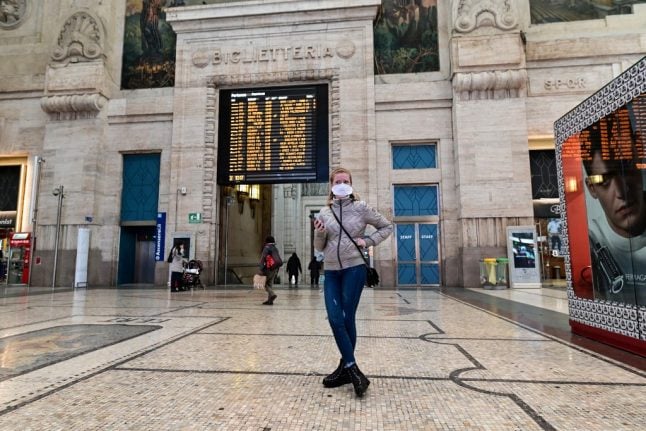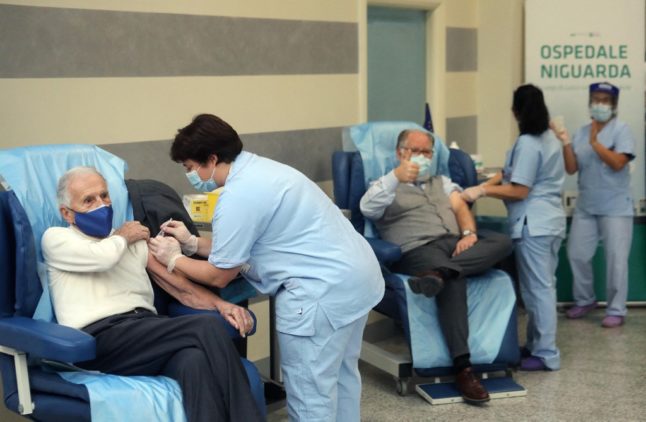Airlines including EasyJet, Ryanair, British Airways were still serving airports in Milan and Venice — the region's two biggest transport hubs — even as all three companies announced fresh cuts to their flight schedules serving northern Italy.
The government on Sunday imposed sweeping measures to restrict travel in the prosperous north, the centre of Italy's virus outbreak. Travel is allowed only for compelling reasons such as work or medical need — and for those who had been in the region temporarily to return home.
Officials promised to set up checkpoints to enforce the measures, which are backed by fines of more than €200 ($230).
READ ALSO: What you need to know about the new coronavirus measures in Italy
On a main road leading out of the city of Modena — inside the exclusion zone — AFP saw controls come into effect on Monday afternoon, with at least one car being turned back.
But there was some concern about whether the checks are rigorous enough.
“I find it a bit pointless to establish a red zone if you can get in and out freely,” said 21-year-old courier Jonuzi Agron. “If I go to Bologna from Modena and no one controls me I can infect anyone.”
Rail operator Trenitalia has made changes to its schedules but is still running services in and out of the region.
At Milan's central train station on Monday passengers had to queue up at special checkpoints staffed by soldiers and police.
“I'm about to leave this city because I'm afraid to be here,” said 20-year-old student Adriana from Belarus as she made her way to her train.
READ ALSO: 'You can feel the anxiety in the air': 15 million Italians get to grips with quarantine

Photo: Miguel Medina/AFP
Airlines had already been cutting routes in recent weeks and national carrier Alitalia said it would stop flying from Milan's Malpensa airport. An AFP photographer at Malpensa said the terminal was virtually deserted on Monday morning.
However, domestic flights from the city's Linate airport would continue, Alitalia said.
Ryanair said on Monday it was reducing services in part because many passengers were not turning up for flights they had booked.
But the airline said it wanted to maintain some services to Italy “to bring home” foreigners in Lombardy and other virus-hit regions.
Linate airport's website was showing a spate of cancellations, while at Malpensa where flights were still scheduled to take off, one cafe worker said the effect on the airport has been worse than the September 11 attacks in the
United States.
READ ALSO:
- Is it still safe to visit Italy after the coronavirus outbreak?
- These are the airlines cancelling flights to Italy amid the coronavirus outbreak
- Coronavirus forces Italy to close its biggest tourist attractions
Rail passengers told AFP their identity documents were being checked on arrival to make sure they were residents of Milan.
Travellers venturing in or out of the new zone are meant to present “self-certifications” of their reasons for travel, which officials say can then be checked at further checkpoints.There will also be temperature checks for passengers at train station entrances and exits.
Checks are also being introduced for cruise ships at Venice port. Passengers “will not be able to disembark to visit the city but can transit only in order to return to their place of residence or countries of origin”.
But the more stringent quarantine measures which were imposed last month around 11 areas considered to be the centres of the outbreak have now been partially lifted, according to officials in Codogno, one of the towns affected.
Massimo Galli, the head of a team of doctors from the Biomedical Research Institute in Milan who identified the Italian strain last month, told AFP that the lifting of those measures “makes no sense”.
“These measures need to be in place for longer in order for the sacrifice they have made [being under lockdown] to be effective,” he said.
Find all The Local's coverage of the coronavirus outbreak in Italy here.



 Please whitelist us to continue reading.
Please whitelist us to continue reading.
Member comments